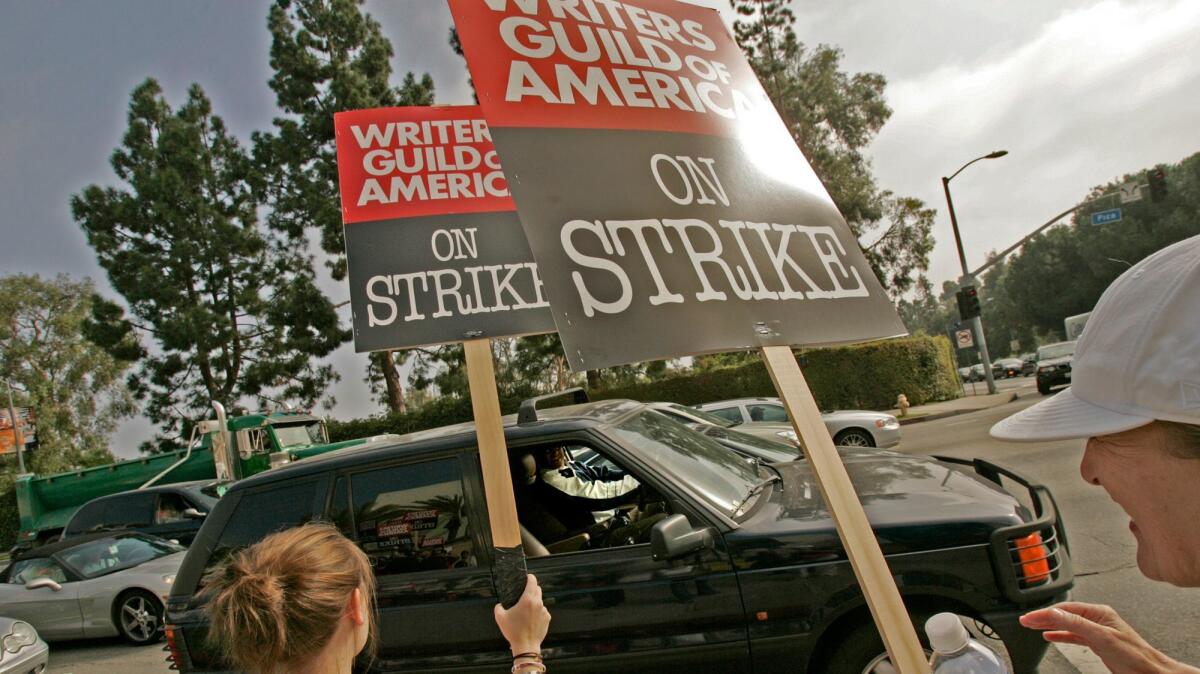Writers Guild of America will ask members to authorize a strike as contract talks falter

After two weeks of contract talks, leaders of the Writers Guild of America are asking union members to give them the authority to call a strike.
The union called for the strike authorization vote — a tactic that unions use to gain leverage in negotiations — after talks broke down with the Alliance of Motion Picture and Television producers, which represents the major studios, TV networks and independent producers.
In an announcement Friday night, WGA negotiators said: “We do not yet have a deal. We will continue to bargain in good faith to make such a deal.”
The union claims that entertainment companies are making profits while writers’ economic fortunes have declined sharply in the last five years.
Among the key points of contention is compensation for TV writers, who are facing shorter seasons and salaries that have plummeted in recent years. This is “at the core of the problem,” the guild said Friday.
The WGA said that producers have so far balked at demands for greater pay for writers as well as for increases in residuals for streaming media.
The union said its demands for changes to its pension and health plans have met with similar resistance.
“The package, taken as a whole, is unacceptable,” the WGA said in the statement. “We would be derelict in our duty if we accepted it.”
Negotiations have been held at the Sherman Oaks headquarters of the AMPTP. In a statement, the alliance accused the union of ending “negotiations at an early stage in the process in order to secure a strike vote rather than directing its efforts at reaching an agreement at the bargaining table. Keeping the industry working is in everyone’s best interests, and we are ready to return to negotiations when they are.”
The talks are aimed at forging a new film and TV contract to replace the current three-year agreement that expires May 1. Negotiations could theoretically continue until the contract expiration date. No date has been set for the strike authorization vote, which gives union leaders the authority to call a strike if they are unable to negotiate a new contract on behalf of the guild’s 12,000 members.
The last major WGA strike was the 2007-08 walkout that lasted 100 days and brought Hollywood activity to a near-halt. The work stoppage affected movie and TV production throughout the country.
Among the issues currently on the negotiating table are residual payments for streaming media, including services such as Netflix, Amazon and Hulu. The residuals are compensation that writers receive when their work is rerun on digital platforms.
Other guilds also are pressing for a larger share of new-media revenue. In January, the Directors Guild of America ratified a new three-year contract. The DGA didn’t disclose terms of the agreement but said the deal more than triples residuals for members working on original content for the biggest streaming companies.
ALSO
Why California stinks for first-time home buyers
The old magazine scam is alive and well. Here’s how to fight back
LAX trains workers to provide ‘gold standard’ service for fliers
UPDATES:
2 p.m.: This article was updated with additional background on the contract talks.
This article was originally published at 9:10 p.m.
More to Read
Inside the business of entertainment
The Wide Shot brings you news, analysis and insights on everything from streaming wars to production — and what it all means for the future.
You may occasionally receive promotional content from the Los Angeles Times.











